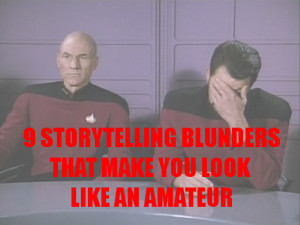You may be a grammatical black belt, leaping big vocabulary words in a single bound. But take care: you could still be making elementary mistakes that’ll leave your readers cringing, eye-rolling, and yes, even face-palming.
Protect your writerly reputation! Check out these nine storytelling mistakes that make you look like a total n00b—and learn how to fix them like a pro.
1. The Perfect Hero: Best We’ve Ever Seen
The problem: Your character is the Best at Everything, constantly impresses the other characters, and frequently breaks rules yet never gets in real trouble. This character is so cliché she has a name: Mary Sue. She’s amusing for awhile, but only as a daydream. She soon makes you look shallow and self-indulgent.
The fix: Give her fears and weaknesses. Trip her up. Relate to your readers by appealing to their vulnerability. As the Pixar geniuses remind us, we admire characters more for trying than for succeeding.
2. The Weak Villain: Foiled Again!
The problem: This mistake often goes with the one above. Your brilliant hero thwarts the villain yet again! Perhaps even single-handedly! But if your villain is that weak, you’re not challenging your hero, which means you have no conflict and therefore no story. It’s boring.
The fix: Give your villain multiple advantages over your hero. A bigger army, bigger guns, more political influence. Your hero should suffer greater and greater losses as he clashes with the villain throughout the story, until he reaches his lowest point, and finds some tiny advantage that helps him defeat the villain—probably an advantage you introduced near the beginning.
3. Instant Romance: Just Add Danger!
The problem: Contrary to action movie tradition, “we got shot at together” is not a valid basis for True Love, especially when your characters have only known each other for weeks, days, or even hours. Those stories can be titillating, but not moving.
The fix: Give your characters actual personalities, and something within those personalities that suits them for each other. Watch the first twenty minutes of Pixar’s Up or Wall-E to see how it’s done. (Or here’s more help avoiding shallow romance.)
4. Exposition: If You’re Just Joining Us…
The problem: Flat-out explanations for past events instead of hinting at them. You often see these in the subsequent volumes of a series to recap events from previous books, but you’ll also see it in standalone books to reveal heroes’ personal histories, or even to remind the reader what’s happened so far. It’s awkward and often boring.
The fix: This is a classic example of when you should show, not tell. Don’t say it, convey it. Here’s how to get rid of background exposition.
5. Laundry List Descriptions: Check, Check, Check
The problem: Describing every character with the same handful of features. Hair color. Eye color. And every article of clothing. You’re trying to give the reader a complete picture, but by the third or fourth detail their eyes are glazing over.
The fix: Pick a few details that inspire your readers to fill in the rest. What would strike you when you first met the character? What would you remember about him later? A unique mustache? A discoloration of the skin? An elaborately pocketed cloak? Focus on these details and give minimalist descriptions for the rest.
6. Surprise! It Was All a Dream
The problem: You coax your readers through some tragic or thrilling scene and then jerk them at the end by revealing it was only a dream. Unless you’re writing the next Inception, do not do this. It’s a poor attempt at increasing tension, which ends up feeling more like a broken promise.
The fix: If you must include a dream sequence, make it obvious from the beginning of the scene that it is a dream. Preface it with “I had another dream last night,” or fill it with surreal, dream-like qualities.
7. The Idiot Class: They’re All Like That!
The problem: Portraying a people group, often a religious or political organization, as nincompoops. In amateur YA fiction it’s common for all the adults to be idiots, while the kids cleverly fool them at every turn. Unless you’re writing farce, this makes you look shallow and bigoted.
The fix: A few fools are fine, but if you want to be taken seriously, include people with depth on both sides of the conflict. Don’t make your hero—or his cause—infallible.
8. Mini Morals: Holier Than Thou
The problem: The hero sidesteps from the plot onto a soapbox for some religious, political or ethical cause. It only lasts for a few lines of dialogue, but it’s spammy, like when you’re talking to a friend about your favorite movie, and he segues into all the reasons you should join the Church of the Lonely Potato. It’s annoying even if you already belong to the Church of the Lonely Potato.
The fix: If you’re going to have a moral or message in your story, the entire story should work to tell that moral, and you shouldn’t flatly state it at the end like in a Saturday morning cartoon. Instead, demonstrate it through the events and consequences of the story.
9. Pop Culture References: As Troubling as Justin Bieber
The problem: Modern pop culture references date your work and break your readers’ suspension of disbelief. In five years, is your Gotye reference going to make you look cool or out of touch? And blatant Blazing Saddles references do not help immerse me in your medieval dragon world, Mr. Paolini!
The fix: If your world isn’t connected to our modern world, avoid references entirely. If you’re writing about the future, you have more leeway, but stick with icons that have proven staying power (Bieber will likely follow Aaron Carter into obscurity, but The Beatles are safe territory). Bonus tip: reference your own made-up icons that are popular in your futuristic world.
Are you guilty any of these mistakes? What other amateur writing blunders make you cringe when you read them?
—

Whatever you do when writing your novel, don’t do these nine things.






